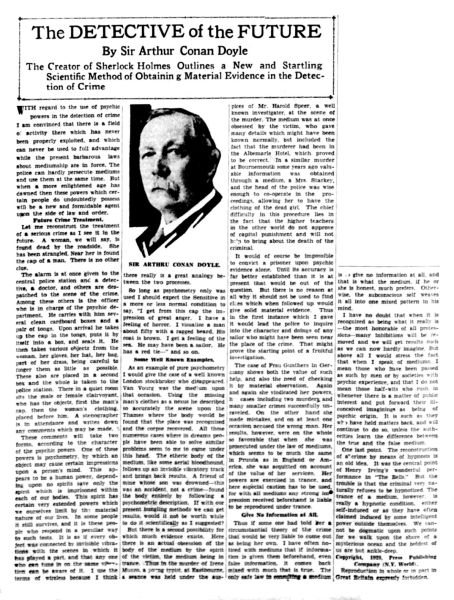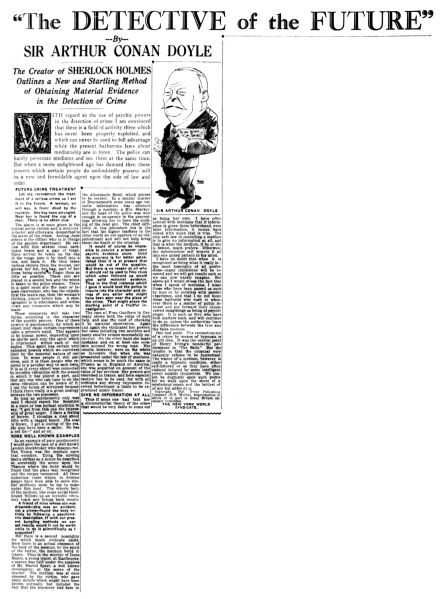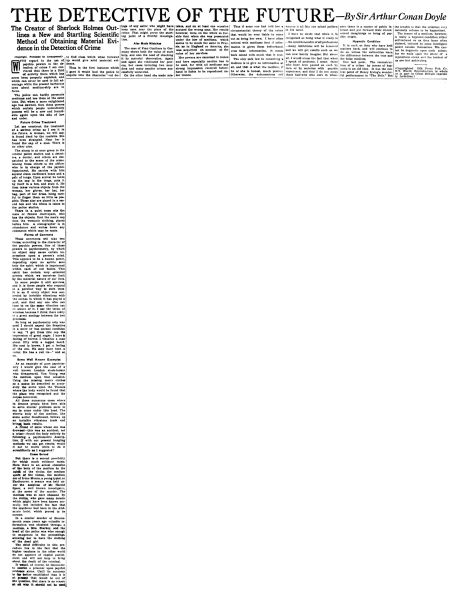The Detective of the Future

The Detective of the Future is an article written by Arthur Conan Doyle published in the magazine section of The New York World on 20 october 1929.
In the original typescript, the title was "The Psychic Detection of Crime" (typed on page 1 and handwritten by ACD on page 2). Someone wrote on p. 1 "For Mag. Oct. 20", and on p. 2 "Return copy to Palmer". The typescript signed by Arthur Conan Doyle (Crowborough, September 4) was sent to "The Paget Literary Agency, 415 Lexington Avenue, New York City."
Editions
- in The New York World (20 october 1929?, magazine section [US])
- in The Ottawa Evening Citizen (19 october 1929, 3rd section [CA]) 1 photo
- in The Winnipeg Evening Tribune (2 november 1929, mag section [CA])
- in The Calgary Daily Herald (9 november 1929, mag section [CA]) 1 illustration
The Detective of the Future


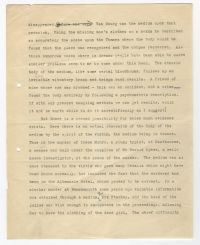

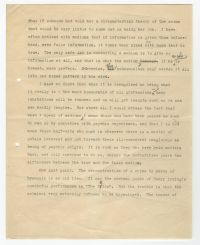

The Psychic Detection of Crime
With regard to the use of psychic powers in the detection of crime I am convinced that there is a field of activity there which has never been properly exploited, and which never can be used to full advantage while the present barbarous laws about mediumship are in force. The police can hardly persecute mediums and use them at the same time. But when a more enlightened age has dawned then these powers which certain people do undoubtedly possess will be a new and formidable agent upon the side of law and order.
Let me reconstruct the treatment of a serious crime as I see it in the future. A woman, we will say, is found dead by the roadside. She has been strangled. Near her is found the cap of a man. There is no other clue.
The alarm is at once given to the central police station and a detective, a doctor, and others are dispatched to the scene of the crime. Among these others is the officer who is in charge of the psychic department. He carries with him several clean cardboard boxes and a pair of tongs. Upon arrival he takes up the cap in the tongs, puts it by itself into a box, and seals it. He then takes various objects from the woman, her gloves, her hat, her bag, part of her dress, being careful to finger them as little as possible. These also are placed in a second box and the whole is taken to the police station. There in a quiet room sits the male or female clairvoyant who has the objects, first the man's cap, then the woman's clothing, placed before him. A stenographer is in attendance and writes down any comments which may be made.
These comments will take two forms, according to the character of the psychic powers. One of these powers is Psychometry, by which an object may cause certain impressions upon a person's mind. This appears to be a human power, depending upon no spirits save only the spirit which is imprisoned within each of our bodies. This spirit has certain very extended powers which we ourselves limit by the material nature of our lives. In some people it still survives, and it is these people who respond in a peculiar way to such tests. It is as if every object was connected by invisible vibrations with the scenes in which it has played a part and that anyone who can tune in on the same vibration can be aware of it. I use the terms of wireless because I think there really is a great analogy between the two processes.
So long as psychometry only was used I should expect the Sensitive in a more or less normal condition to say, "I get from this cap the impression of great anger. I have a feeling of horror. I visualise a man about fifty with a ragged beard. His coat is brown. I get a feeling of the sea. He may have been a sailor. He has a red tie—" and so on. As an example of pure psychometry I would give the case of a well-known London stockbroker who disappeared before the war. Van Bourg was the medium upon that occasion. Using the missing man's clothes as a nexus he described so accurately the scene upon the Thames where the body would be found that the place was recognised and the corpse recovered. All those numerous cases where in dreams people have been able to solve similar problems seem to me to come under this head. The etheric body of the medium, like some oerial bloodhound, follows up an invisible vibratory track and brings back results. A friend of mine whose son was drowned — this was an accident, not a crime, found the body entirely by following a psychometric description. If with our present bungling methods we can get results, would it not be worth while to do it scientifically as I suggest.
But there is a second possibility for which much evidence exists. Here there is an actual obsession of the body of the medium by the spirit of the victim, the medium being in trance. Thus in the murder of Irene Munro, a young typist, at Eastbourne, a seance was held under the auspices of Mr Harold Speer, a well-known investigator, at the scene of the murder. The medium was at once obsessed by the victim who gave many details which might have been known normally, but included the fact that the murderer had been in the Albemarle Hotel, which proved to be correct. In a similar murder at Bournemouth some years ago valuable information was obtained through a medium, Mrs Starkey, and the head of the police was wise enough to co-operate in the proceedings, allowing her to have the clothing of the dead girl. The chief difficulty in this procedure lies in the fact that the higher teachers in the other world do not approve of capital punishment and will not help to bring about the death of the criminal.
It would of course be impossible to convict a prisoner upon psychic evidence alone. Until its accuracy is far better established than it is at present that would be out of the question. But there is no reason at all why it should not be used to find clues which when followed up would give solid material evidence. Thus in the first instance which I gave it would lead the police to inquire into the character and doings of any sailor who might have been seen near the place of the crime. That might prove the starting point of a fruitful investigation.
The case of Frau Gunthers in Germany shows both the value of such help, and also the need of checking it by material observation. Again and again she vindicated her powers, her cases including two murders and many smaller crimes successfully unravelled. On the other hand she made mistakes, and on at least one occasion, accused the wrong man. Her results, however, were on the whole so favourable that when she was prosecuted under the law of mediums, which seems to be much the same in Prussia as in England or America, she was acquitted on account of the value of her services. Her powers are exercised in trance, and here especial caution has to be used, for with all mediums, any strong impression received beforehand is liable to be reproduced under trance.
Thus if someone had told her a circumstantial theory of the crime that would be very liable to come out as being her own. I have often noticed with mediums that if information is given them before-hand, even false information, it comes back mixed with much that is true. The only safe law in consulting a medium is to give no information at all, and that is what the medium himself, if he is honest, much prefers. Otherwise, his subconscious self weaves it all into one mixed pattern in his mind.
I have no doubt that when it is recognised as being what it really is — the most honourable of all professions, any inhibitions will be removed and we will get results such as we can now hardly imagine. But above all I would stress the fact that when I speak of mediums I mean those who have been passed as such by men or by societies with psychic experience, and that I do not mean those half-wits who rush in whenever there is a matter of public interest and put forward their ill-conceived imaginings as being of psychic origin. It is such as they who have held matters back, and will continue to do so, unless the authorities learn the difference between the true and the false medium.
One last point. The reconstruction of a crime by means of hypnosis is an old idea. It was the central point of Henry Irving's wonderful performance in "The Bills" [1]. But the trouble is that the criminal very naturally refuses to be hypnotised. The trance of a medium however is really a hypnotic condition, either self-induced or as they have often claimed induced by some intelligent power outside themselves. We cannot be dogmatic upon such points for we walk upon the shore of a mysterious ocean and the boldest of us are but ankle-deep.
A. Conan Doyle.
Crowborough.
Sept 4.
Publications
-
The Ottawa Evening Citizen (19 october 1929, 3rd section, p. 3)
-
The Calgary Daily Herald (9 november 1929, mag section, p. 4)
-
The Winnipeg Evening Tribune (2 november 1929, mag section, p. 3)
- ↑ "The Bells".
